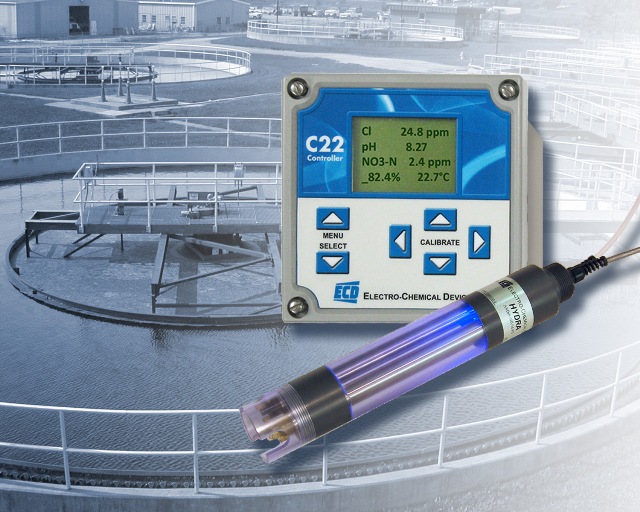Feb 13 2014
Offering a precision nitrate ISE electrode sensor with an integral self-cleaning sprayer, the new HYDRA Nitrate Analyzer System from Electro-Chemical Devices, Inc. (ECD), is ideal for nitrate monitoring in wastewater treatment aeration basins.

The HYDRA Nitrate Analyzer System monitors the nitrification process in aeration basins at wastewater treatment plants, a process during which toxic ammonium ions are oxidized into much less toxic nitrate ions using an aerobic activated sludge process. De-nitrification reduces the nitrate ion (NO3-) to nitrogen gas (N2) by an anoxic reaction in the same treatment basin or in a separate anaerobic digester. The NO3--N measurement helps optimize the methanol being fed to the digester, minimizing cost, and also to provide a trend indication of the total nitrogen (TN) in the effluent.
The intelligent HYDRA Nitrate Analyzer System measures the concentration of dissolved nitrate as nitrogen (NO3--N) in water. The sensor uses two electrodes to determine the NO3--N concentration: a nitrate ion electrode and a chloride ion electrode. An optional electrode is also available for pH or ammonium measurement.
The nitrate ion electrode provides the primary measurement. A second electrode measures the Chloride ions in the sample which interfere with the nitrate electrode. The HYDRA Analyzer subtracts the appropriate amount of signal from the nitrate measurement for accurate monitoring. The sensor also detects temperature, and the analyzer provides a temperature-compensation calculation for accurate measurement.
The rugged ECD HYDRA Analyzer nitrate sensor offers 1.25-inch NPT rear facing threads for attaching an extension/immersion tube for easy installation from catwalks or handrails. Internal signal conditioning allows the sensor to be mounted up to 200 meters from the analyzer. The sensor is extremely low-maintenance, featuring a movable electrode guard to facilitate easy electrode replacement when necessary.
Adding the optional AC10 Automatic Sensor Cleaner decreases HYDRA Analyzer sensor maintenance cycles and helps maintain sensor measurement accuracy in turbid water conditions by preventing the buildup of biofilms and other soft coatings. The AC10 cuts plant operating costs by reducing manual cleaning time and the amount of chemicals used for unnecessary water treatments performed due to inaccurate sensor readings caused by films and coatings that develop over time.
The AC10 can be used as either a Single Channel or Dual Channel System with the HYDRA Nitrate sensor. Combined with a Sensor Spray Head and a C22 Analyzer/Controller, it uses pressurized air to generate an area of high turbulence in the water surrounding the measurement end of the sensor.
The system’s HYDRA Analyzer is configured to periodically actuate a cleaning cycle using the integral spray cleaner in the nitrate sensor, minimizing the formation of biofilms or other coatings on the electrodes and keeping maintenance to a minimum. The cleaning cycles feature a user configurable period and duration. During the cleaning cycle the 4-20 mA output is held at either a preset value or the last value.
The AC10 Air Blast Spray Cleaner features a highly reliable high current contactor that assures years of trouble free service. It is available with either a 115 VAC 3.0 Amp or 220 VAC 1.3 Amp Air Compressor, housed in a rugged, corrosion resistant, fiberglass reinforced polyester enclosure. Installation options include wall mounting or an optional 2-inch handrail mounting system.